Support local Black-owned businesses
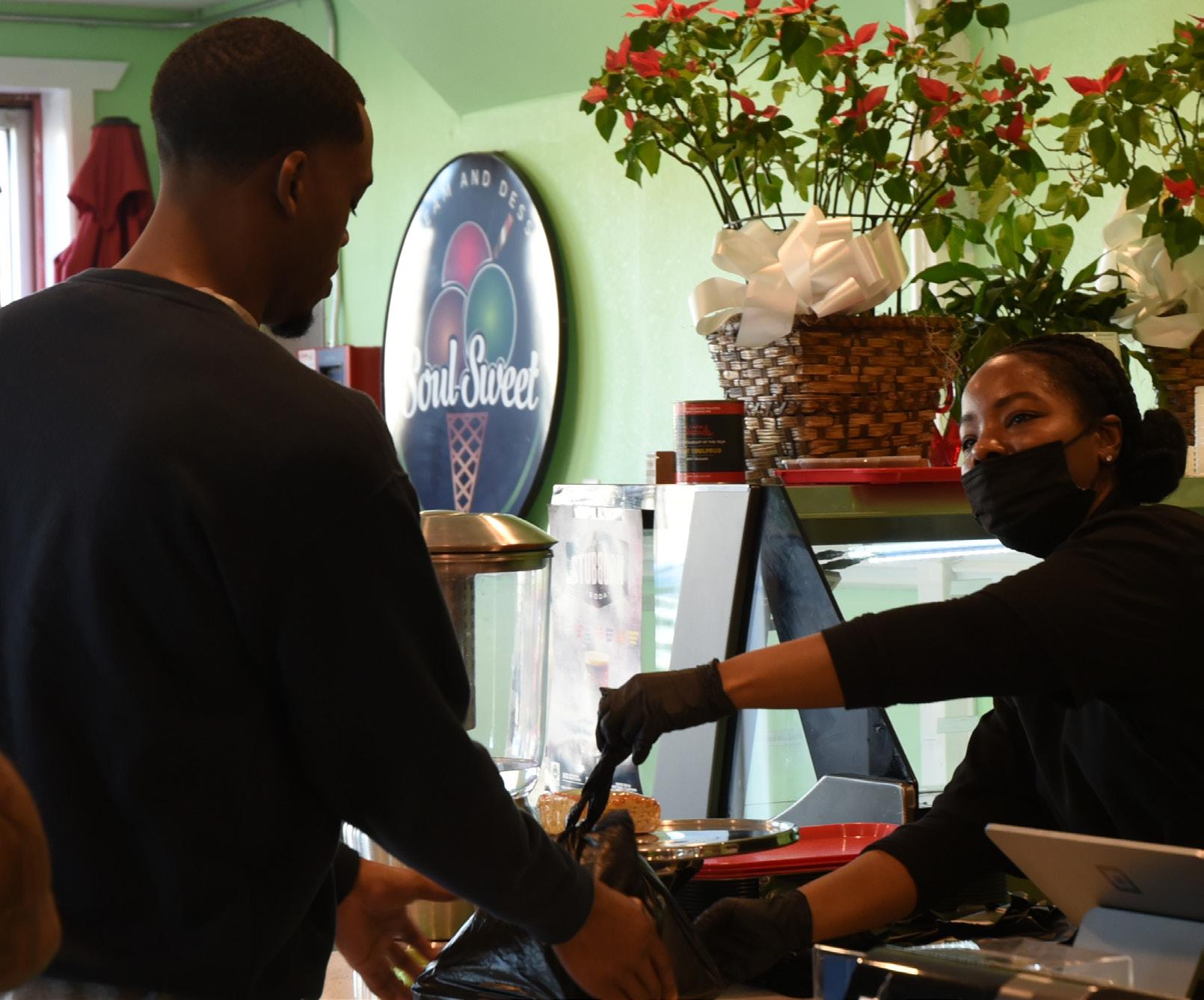
Give back to the community that shapes New Orleans
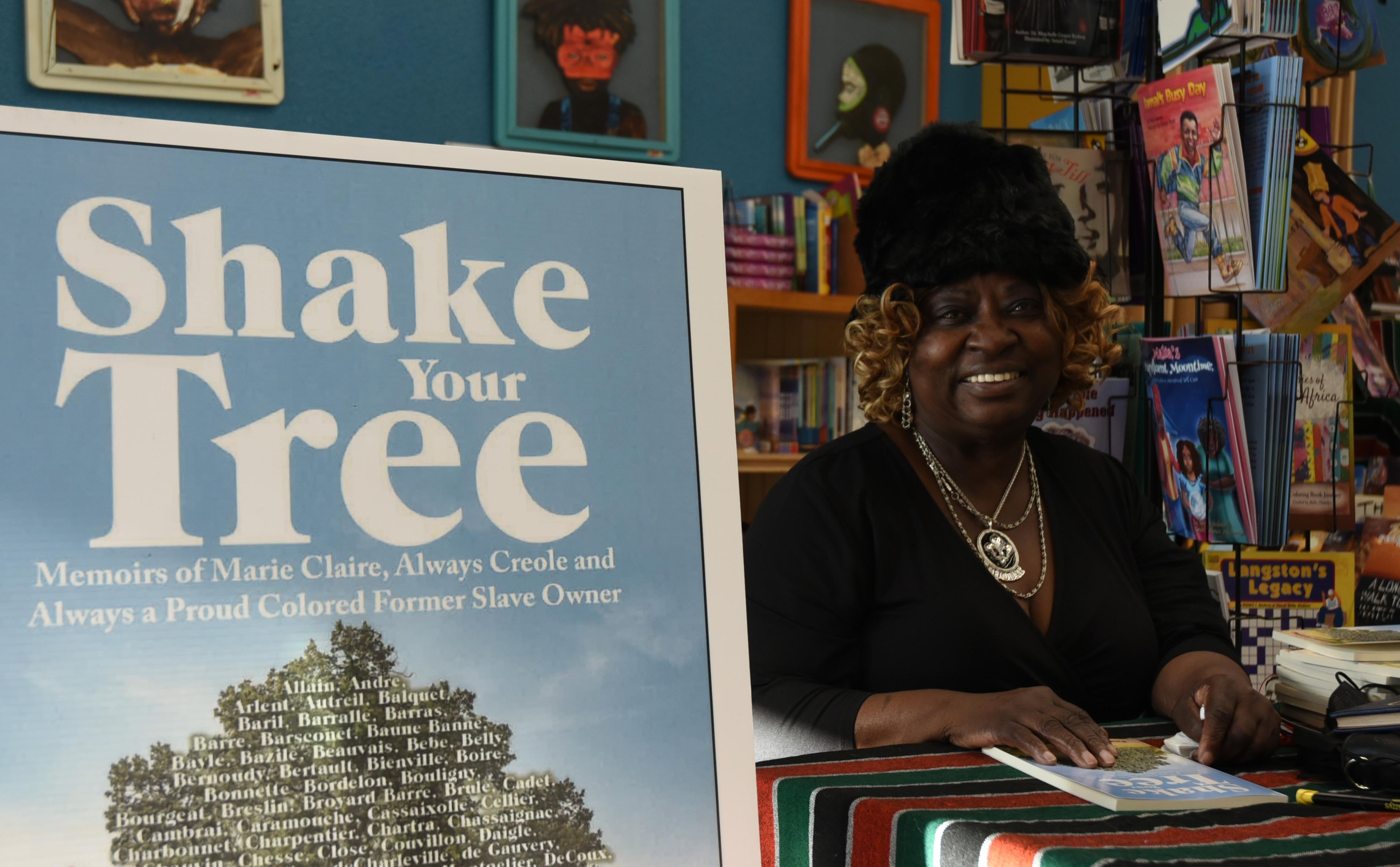 By Maleigh Crespo macrespo@my.loyno.edu
By Maleigh Crespo macrespo@my.loyno.edu
While New Orleans is known as a melting pot of cultures and communities, Black people make up more than 50 percent of the city, according to the U.S. Census Bureau. The culture and customs that we love and appreciate are founded upon the Black experience. Mardi Gras, Creole cuisine, and jazz music are just a few of the things that make New Orleans a city that many love. The contributions of the Black community must be honored and recognized when exploring, touring, and living in this city
See Life & Times, page 7



CRIME MAP 2 | PUZZLES 2 | NEWS 3 | WORLDVIEW 4 | LIFE & TIMES 7 | SPORTS 9 | EDITORIAL 10 | OPINION 11 FIND US ONLINE AT LOYOLAMAROON.COM FB.COM/THELOYOLAMAROON @LOYOLA_MAROON @LOYOLA_MAROON THE MAROON
a greater LoyoLa Loyola University • New Orleans • Volume 101 • Issue 03 • February 10, 2023
For
A cashier at Sweet Soulfood serves customer food at checkout on Feb. 6, 2023. Sweet Soulfood is a Black-owned, vegan restaurant on Broad Street. Anna Hummel/The Maroon
Community
more
a bookstore,
community-wide
Community Book Center hosts author Paulette Fenderson Hebert for the signing of her book, “Shake Your Tree.”
Book Center is
than
but a home to many
events in the Seventh Ward. Anna Hummel/The Maroon
STAFF
FRERET ST
ST. CHARLES AVE
CLAIBORNEAVE S. CARROLLTON AVE BROADWAY ST TULANE LOYOLA
NASHVILLE AVE JEFFERSON AVE
NAPOLEONAVE
CRIME MAP LEAKEAVE
MAGAZINE ST
Executive Producer: Chloe Caudle
Assistant Editors: Anna Hummel, Maria

DiFelice, Nadir Benslimane, Kincaid Leger, Alana
Thompson, Veronica Offner, Ella Michna
Lead Page Designer: Sophia Maxim
Distribution Manager: Abigail Schmidt
Digital Team: Hannah Bauer, Addison Laird,
Dajah Saul
Adviser: Michael Giusti

CONTACT US


Main Office (504) 865-3535
Business Office/Advertising (504) 865-3536




Adviser’s Office (504) 865-3295


Correspondence maroon@loyno.edu
Letters to the editor letter@loyno.edu

Advertising ads@loyno.edu
Website www.loyolamaroon.com
Twitter @loyola_maroon
Facebook The Maroon
Instagram @loyola_maroon
Our office is in the Communications/Music Complex, Room 328.
Send mail to: The Maroon, Loyola University, Campus Box 64, 6363 St. Charles Ave., New Orleans, LA 70118
The Maroon is published every Friday. Unless otherwise noted, all content is copyrighted by The Maroon. All rights reserved. First copy free to students, faculty and staff. Every additional copy is $1.00. The Maroon is printed on 30 percent postconsumer recycled content.
THE MAROON February 10, 2023 2
PARKAUDUBON
Sex Crime 1300 Block of Broadway St. Feb. 3 12:00 Vehicle Burglary 800 Block of Burdette St. Feb. 3 1:00 p.m.
Across 1 "__ Bloods" 5 "The Goldbergs" network 8 Reagan & Howard 9 "Teenage Mutant __ Turtles" 12 "__ 66" (1960-64) 13 Actor James 14 "Joanie Loves Chachi" costar 15 Urkel,
mother & others 23
24
actress
Rookie: __" 26 Edgar Bergen's Mortimer 28 Letters of urgency
Rogers & Clark
of The Mamas & the Papas
Environmental agcy.
1986-90 alien sitcom
"__ Shoot Me!"
Warm and cozy
MRI findings
role
Scottish denials 43 90 degrees from ENE 44 Shrek, for one
1 Wide
Julia
__ others…"
Suffix for legal or journal 5 Costs __ and a leg 6 Big
Street" character 7
Politics" network
Fire" actor
role in "The Little Mermaid"
Bat stat
Heroes":
TV
and Butt-__"
opera
Mine & __";
movie 23
Boone"
"The __ and the Furious"; Vin Diesel film 26 Casa wife: abbr. 27 Actor Nick 30 "Pirates of the Caribbean: The __ of the Black Pearl" 31 Burro 33 Sign of life 34 "Ice __"; animated film 36 Montana & Minoso 37 Obstacle 39 Sinai & Fuji: abbr. 40 Family card game For weekly puzzle answers, download The Loyola Maroon Mobile App Apple Store Google Play
for one 16 __ Caesar 18 Driver's lic. & Soc. Sec. card 19 Lead role on "JAG" 20 Bewildered 21 Bambi's
Actress Sally
"NCIS: Los Angeles"
25 "The
29
30 Member
32
35
36
37
38 Unwanted
40 __ Fester; "The Addams Family"
41 Actor Rob 42
Down
2 Actress
3 "Do
4
__; "Sesame
"Inside
10 "Chicago
11 Lead
12
13 Setting for "Hogan's
abbr. 15 __ Bridges; Don Johnson
role 17 "Major __" 19 "Beavis
20 Verdi
22 "Yours,
Dennis Quaid
Parker of "Daniel
25
PUZZLES
Positive results reported in student retention
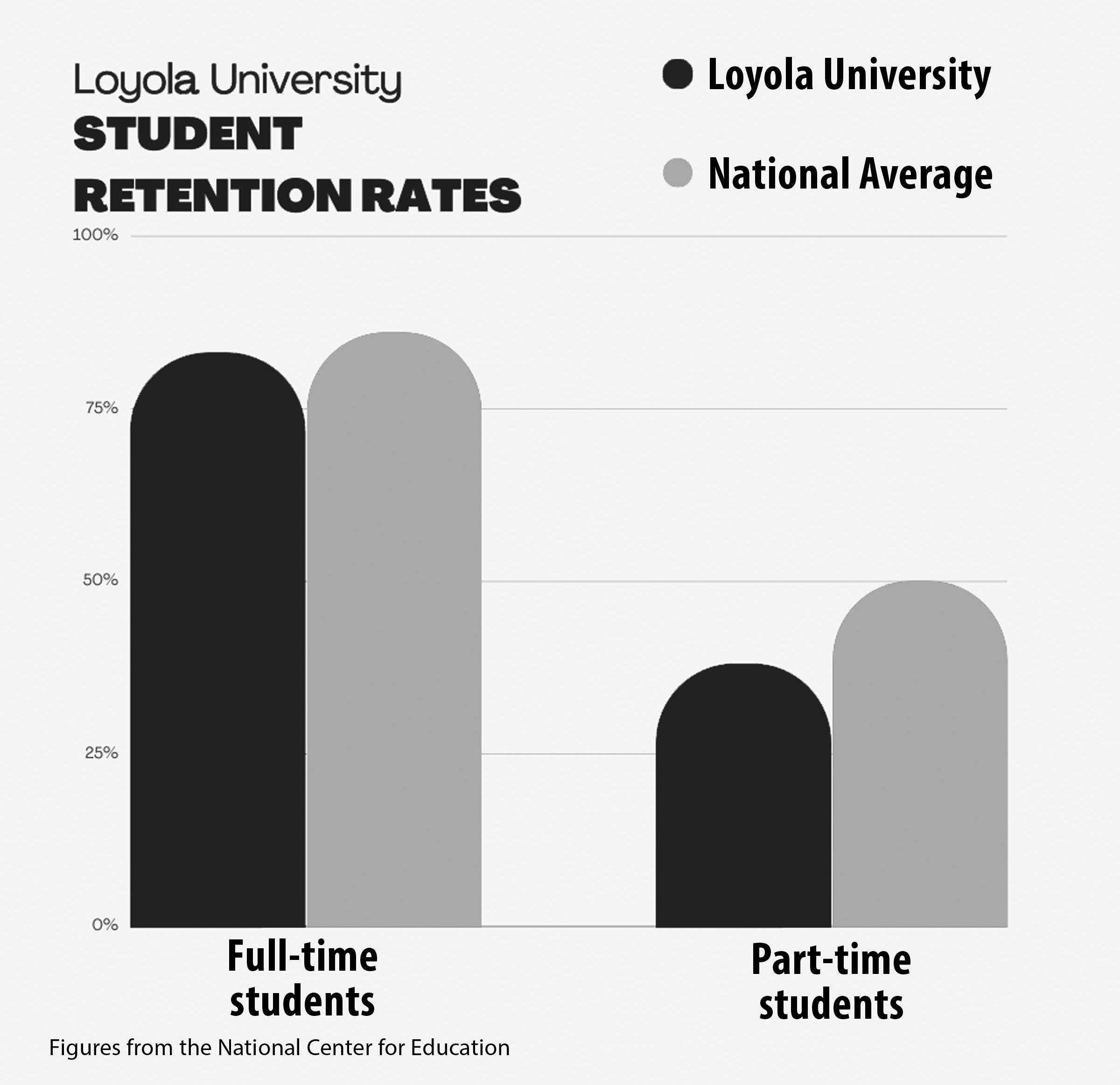 By Arianna D'Antonio asdanton@my.loyno.edu
By Arianna D'Antonio asdanton@my.loyno.edu
@AriDantonio
A full 96% of first-year students returned to the College of Music and Media from the fall to the spring semester — the best retention rate on campus, and a feat credited in no small part to a class pioneered around the idea of showing those students the ropes of college.
The class is called the “college and community” course, and every first-year student in the College of Music and Media was required to enroll. And according to Loyola’s Provost and Senior Vice President of Academic Affairs Tanuja Singh, that course played a huge role in landing that university-best retention rate.
The college and community course was pioneered by the College of Music and Media student services director, Laura Jayne, in partnership with the Assistant Provost of the Student Success Center Liz Rainey. The program provides students with knowledge of university resources and systems available to help them and set them up for success.
C. Patrick Gendusa, chair of the Theatre and Dance Department, said his department has been offering first-year roundtable class since last fall doing a similar thing, but that this takes the idea and offers it college wide.
While several theater and dance professors participated as instructors, musical theater voice instructor Elizabeth Argus said there were several instructors outside of the College of Music and Media that participated as well.
Jayne said that the course goals include helping students connect socially in a post-Zoom world and to ground themselves in what Loyola has to offer, such as the university’s resource centers and health services.
“It’s really hard for this generation of students to ask for help,” Jayne said. “I really want the students to feel empowered, and we set up this course as a path for success for our students.”
Jayne said she hopes the course will spread throughout the university, as it was a great tool for first-year students to share their struggles and figure out their paths to success.
Rainey said, since she is the chair of special studies, she approves courses and develops assessments for new classes like this one.
“The Department of Special Studies houses a range of courses focused on student development, learning strategies, wellness, and advocacy,” she said.
“Our focus is to teach students the skills they need to advocate for themselves and succeed in college, while developing critical consciousness about other cultures, experiences, and learning styles.”
Rainey said the class is being assessed in several different ways, such as pre and post-test surveys, student retention rates, and student and faculty reflections.
“Early results from the surveys indicated that students’ sense of mattering to other students improved from the beginning of the fall semester to the end,” she said.
Institutional research tracks retention rates, and spring statistics will be released on Feb. 17, according to Rainey.
“Based on registered hours, our preliminary retention data has the highest [return] rate for first-year students in the College of Music and Media [96% compared to 93% last year],” Rainey said. “While that cannot all be attributed to this class, this is an exciting finding.”
Rainey said the data and findings are being shared with the other colleges at Loyola for review, in hopes they incorporate this course into their degree plans.
“Students’ reflections are overwhelmingly positive, highlighting they feel cared for and appreciated the non-judgmental space to connect with each other, learn about resources, and transition to college,” Rainey said. “They said things like ‘every time that I came to class, I learned something new. Even more importantly, I learned that I was not strug-
gling alone.’”
Sebastian Walser, a biology pre-health major who is studying vocal performance, was in the course last semester.
“It gave me a mental break from the stress of classes and joined together with other students, and we got to share our day-to-day experiences in a new envi-
Student government plans "merch drop"
By Cristo Dulom csdulom@my.loyno.edu @CristoDulom
In an effort to deliver on two of their campaign promises, the Student Government Association is planning on doing a “merch drop,” according to SGA Director of Communications Asha Altemus.
SGA will be giving away 90 black-andwhite sweatshirts and 100 tote bags with retro-style Loyola art and branded as “A Product of Sga.” The merch will be available on a first-come, first-served basis.
The merch drop, taking place on March 9 from 12:30 – 2 p.m., is part of an SGA communications effort to help build school spirit, promote the university and SGA, and improve the school experience, according to Altemus.
12 full-color sweatshirts will be up for grabs through a raffle system. To enter, students must donate five things to Iggy's Cupboard, according to Altemus. The winners of the full-color sweatshirts will be announced on SGA’s Instagram Live on March 10. All donations should be made at Havoc’s Help Desk.
“Essentially, we want to make sure that Iggy’s Cupboard also gets some attention and some love,” Altemus said.
SGA paid $2,000 for the sweatshirts and $693 for the tote bags to ensure the merch could be free to the Loyola com-
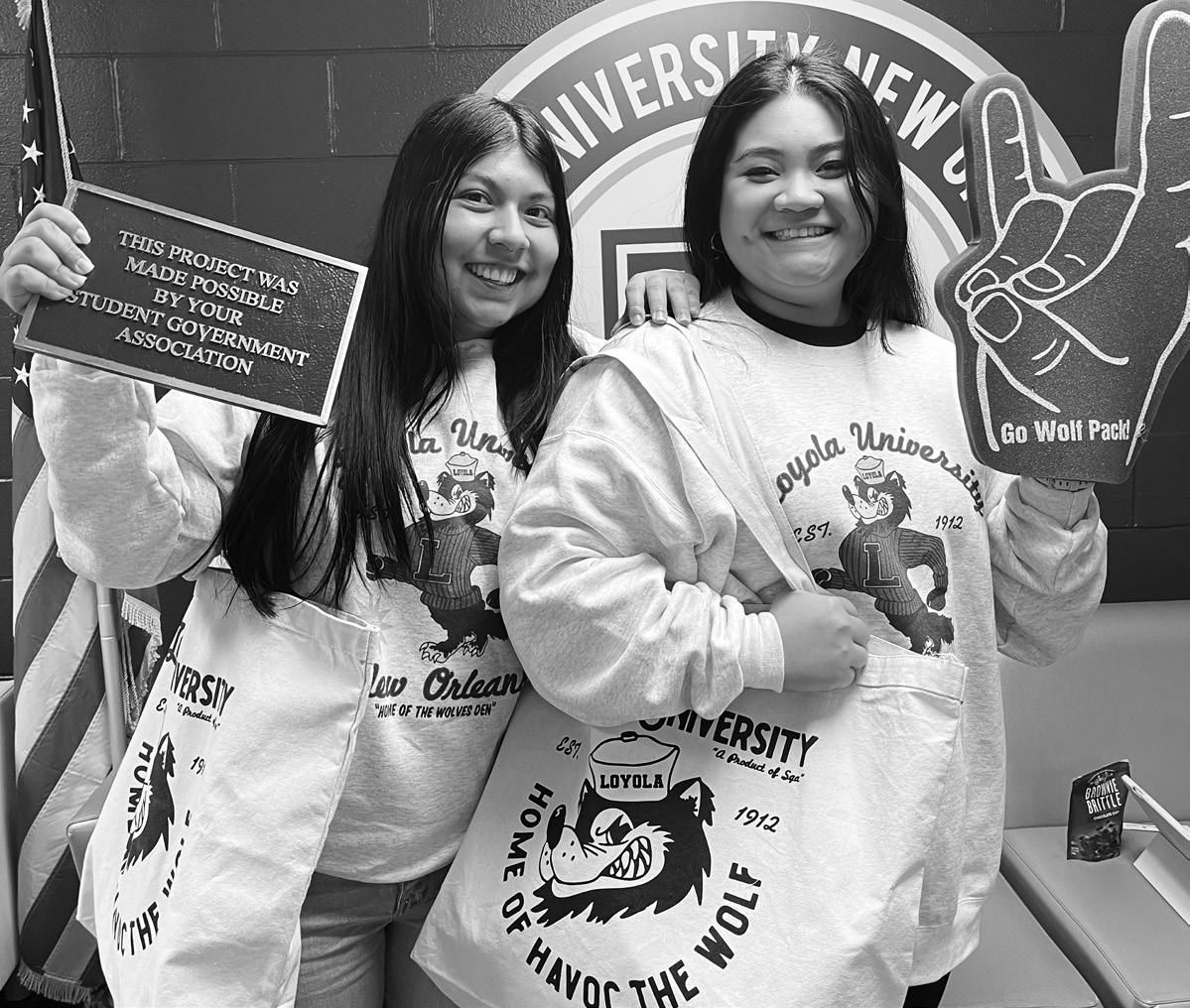
munity, according to Patrice Roberts, SGA director of finance.
The merch has been in the works at SGA since 2021, but delays caused the project to not come to fruition until 2023.
“It was just overwhelming,” Altemus said. “So it didn’t get done.”
Altemus said she put the merch project at the top of her agenda coming into the 2022-2023 school year.
“It’s just essentially something that I can leave my legacy for,” Altemus said.
ronment,” Walser said.
Interim director for the School of Music & Theater Professions, Kate Duncan, discussed the success of the course and said she had seen a difference in students’ abilities to communicate, get things done, and minimize anxiety around registration and talking to pro-
fessors.
“It's great from my administrative perspective, because I can look to the teachers of that class to lend a hand during registration craziness and in other ways,” Duncan said. “I think this should be implemented across the colleges for all incoming undergraduates.”
New virus spreads across campus
By Kloe Witt kgwitt@my.loyno.edu
Hand, foot, and mouth disease is infecting students across Loyola’s campus, according to an email sent to several students in the College of Music and Media by professor Tyler Smith.
The virus is highly contagious and is spread through close personal contact as well as sneezing and coughing, according to the email. Smith said several students in the music department have already tested positive for the virus.
“It generally starts off as a fever and sore throat and is confused for strep but then turns into a very bad rash,” Smith said.
Loyola has not yet been able to provide the number of known positive cases of the virus on campus.
Associate director of public affairs Patricia Murret said the school has seen a spike in the number of people who came to Student Health Services presenting symptoms of hand, foot, and mouth disease.
As positive cases increase across campus, Murret said Loyola has been in contact with the Louisiana Department
of Health.
“It’s not something that has a threat on your long-term health and safety but it is uncomfortable and not pleasant, so we want the campus to stop it where we can and make sure people don’t get it,” Murret said.
Both Murret and Smith said students need to take standard health precautions to stop the spread such as covering their mouths when coughing and avoiding interactions with people who are sick.
“Hopefully, after the last three years of the pandemic, we should all have this down right making sure your surfaces are clean, making sure you wash your hands for 20 seconds,” Murret said.
Alongside the increasing cases of hand, foot, and mouth disease, Smith said that COVID-19 cases have begun to rise on Loyola's campus as well.
The School of Communication and Design has begun to place extra hand sanitizers around the building. According to Murret, Loyola has an aggressive cleaning schedule already in place.
Student Health Services will provide testing for hand, foot, and mouth disease as well as COVID-19 by appointment, according to Murret.
NEWS 3 February 10, 2023 THE MAROON
Student government Vice President Viviana Alvarez (left) and President Stephanie Oblena (right) pose with merch that will be release in March. Photo courtesy of SGA.
(2021-2022)
Louisiana could see benefits from Scalise as majority leader
By Kincaid Leger rrkleger@my.loyno.edu
As the newly minted majority leader, Rep. Steve Scalise of Louisiana’s 1st Congressional District will have a decisive say over how federal funds are allocated in the new congress. This includes funding which could be sent to his own district, which is currently one of the largest recipients of federal assistance.
Following last year's midterm elections, Republicans won a slim majority in the House of Representatives and elevated Scalise to serve as majority leader, the second highest position in the House of Representatives.
Louisiana’s 1st Congressional District includes parts of Orleans Parish, as well as the Northshore, Jefferson Parish, and coastal Southeast Louisiana. Republicans have represented the 1st Congressional District continually since 1977, most recently reelecting Scalise by a nearly 50-point margin.
As majority leader, Scalise has greater control over the legislative process that, according to local politicians from both sides of the aisle, could benefit Southeast Louisiana.
The role of the majority leader
Although the majority leader is not the head of the party, according to Loyola political science professor Sean Cain, they play a key role in conjunction with the speaker in partisan agenda setting.
“The majority leader in the House of Representatives, despite that title, is really the second in command in the majority party because the leader of the majority party is really the speaker of the house,” Cain said. “Many of the speaker's responsibilities are shared with the ma-
jority leader’s, such as the party's agenda, bills favor, relation with the other party, and the White House.”
Cain added that Scalise’s influence over committee appointments, his position within the party leadership, his fundraising abilities, and his position within the ideological center of the Republican party places him as the presumptive next-in-line to the speakership.
“Should there be a change in leadership, he would be the next in line to become speaker within his party,” Cain said.
‘Bringing home the bacon’
With Scalise’s senior position in the House, Cain said Louisianans should expect increased federal funding in the forms of loans and tax credits, formally known as ‘contingent liabilities’.
Delivering results to local districts is very important for party leaders, according to Cain. He said that focusing too much on national politics can result in party leaders being characterized as out of touch with the concerns of their voters and being voted out of office.
“Democrats prefer the former category [direct government grants], Republicans prefer contingent liabilities,”
Cain said. “The 1st District and most of Louisiana are particularly well suited for contingent liabilities because in an area with a propensity for hurricanes, natural disasters, a common form of federal government relief for those are loans and tax credits.”
Cain said that he expects Scalise to use his position as majority leader to direct contingent liabilities towards Southeast Louisiana in order to keep himself ingratiated with the voters of the 1st District while he pursues his national agenda.
“The majority leader has to focus on
policy-making not just for himself but also for many other Republicans who might be vulnerable. So he has to focus not only on bringing home the bacon to his home district but also helping vulnerable Republicans bring home the bacon so that they can get reelected,” Cain said. “So there is a certain danger of losing focus on your own particular constituency as you are trying to hold on to power through helping other members of Congress get reelected.”
Policymakers’ perspectives
State Senator Sharon Hewitt (R-Slidell), who is also running for governor this year, expressed optimism about Scalise’s role as majority leader as well as the positions of other Louisiana legislators.
“The Louisiana congressional delega-

tion members all have really significant positions within the new congress as do our two senators,” she said. “We know that is going to help Louisiana directly with funding but also in terms of prioritizing legislation.”
Hewitt cited Scalise’s role in setting the legislative agenda in her hope for additional funding directed towards Louisiana. Hewitt also said that additional oil and natural gas leasing and funding for coastal restoration projects are initiatives she expects to be addressed.
State Senator Royce Duplessis (D-New Orleans) stressed his disagreement with Scalise on several policy issues including Scalise’s opposition to the Bipartisan Infrastructure bill and the creation of a second minority-majority Louisiana congressional district.
Still, Duplessis said he remains optimistic about having a Louisianian as
majority leader and said that it might benefit Louisiana and New Orleans.
“Anytime the state of Louisiana, or specifically the city of New Orleans, can have someone like congressman Scalise, or anyone from the Louisiana delegation, to have the level of seniority and rank, that should be a good thing for Louisiana,” Duplessis said. “Because even with the division [in congress], there could be the opportunity to have discussions with someone with influence to direct resources to the place that we’re all supposed to be serving.”
Scalise did not respond to The Maroon for an interview.
SOUL reforests New Orleans
By Kloe Witt kgwitt@my.loyno.edu @kloewitt22
Reforestation is growing in New Orleans in part thanks to the Sustaining Our Urban Landscape organization, who plans to increase 10% canopy coverage 10% within 10 years, according to their plan.
SOUL is a non-profit New Orleans organization founded in 2016 with the mission to reforest the city's urban landscape, according to their website.
Loyola alumni, Susannah Burley, is the founder and executive director of the organization. She said that the city is under-forested.
“Not having trees and their absorption power causes us to flood more and exacerbates all of the effects of climate change,” Burley said.
New Orleans is the most deforested city in the United States, according to the U.S. Forest Service. Burley said that with the growing climate crisis, New Orleans has to start acting against it.
“Climate change is happening fast so we need to plant a ton of trees quickly and then we need to keep planting a bunch of trees,” she said.
According to Burley, SOUL is planting live oaks and bald cypress, both of which are able to absorb large amounts of water. With parts of New Orleans being below sea level and prone to flooding, she said these trees are essential to the city.
Burley said if we don’t act soon, New Orleans could change drastically.
“We’re going to look like Venice, Italy,” she said. “It’s very serious.”
The low forestation in New Orleans isn't just caused by damage from hurricanes or high winds, but by lack of regulation on protecting urban habitat, Burley said.
—
“There are no rules or regulations on trees on private property so anybody can tear down a tree despite its value, age, or size in New Orleans Parish,” she said.
According to their website, SOUL looks to forest through sidewalks and general neighborhood areas. While doing this, they allow residents options for what they feel is most beneficial for their neighborhood, while also allowing residents the choice to opt out of the project
as a whole.
“When we go to a new neighborhood, we work with everybody to see where they wanna plant first or what kind of trees they want to see. We basically make a planting plan for the neighborhood,” Burley said.
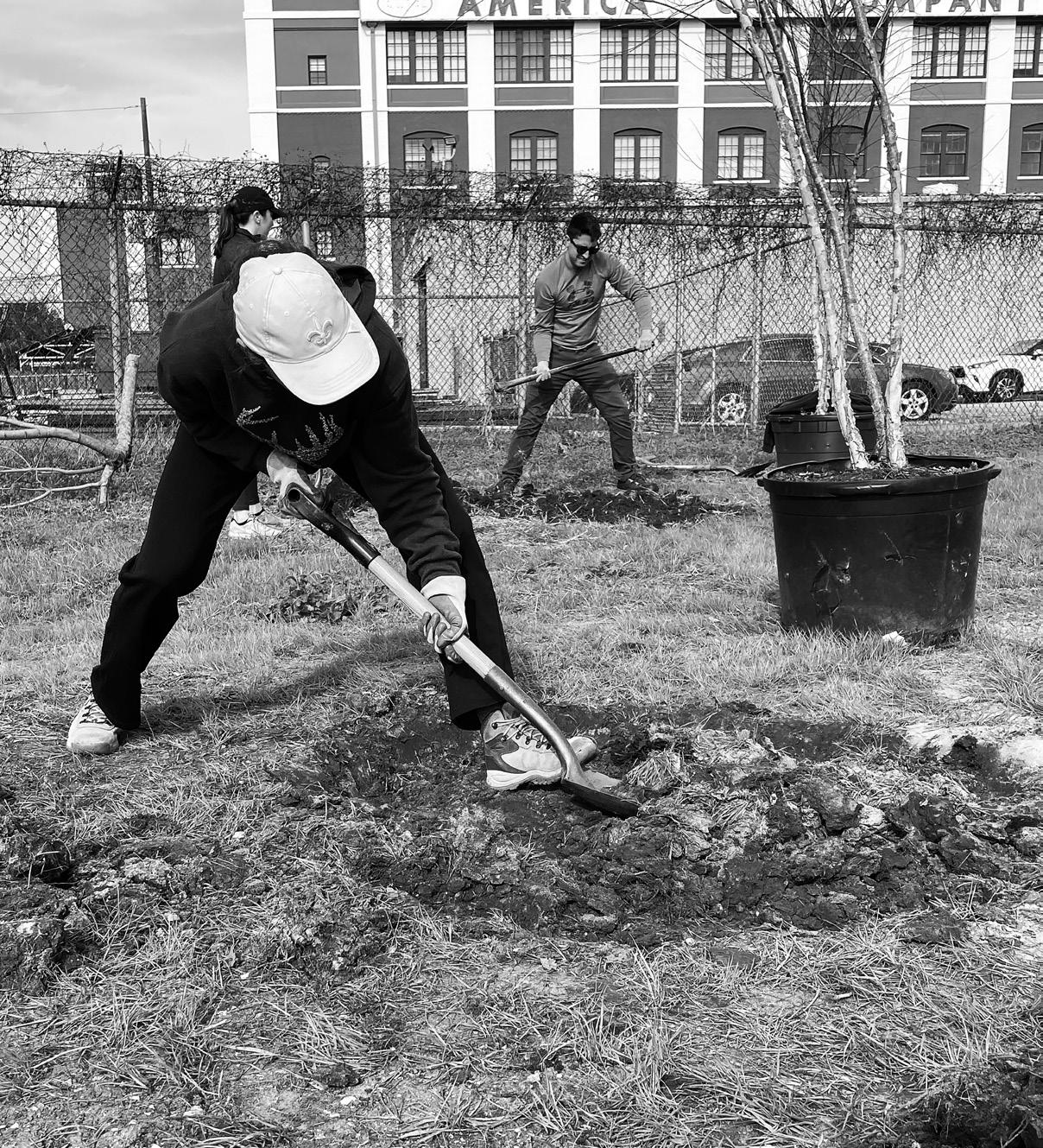
Burley said that around 30% of residents decide to opt out of the project.
She added that SOUL looks to reforest areas in need of more trees as the first part of their plan. While doing this, Burley said they’ve noticed a pattern.
“We want to plant areas that are underforested and those areas usually end up being the poor Black neighborhoods,” she said.
According to Burley, this is caused by the areas being historically redlined and experiencing racist housing practices.
Burley said the organization has a goal to plant 100,000 trees by 2040 and maintain the upkeep of the trees as well. With all of this work, Burley said that the best way for people to help reforest New Orleans is to volunteer, donate, and speak out about the issue.
WORLDVIEW 4 February 10, 2023 THE MAROON
House Majority Leader Rep. Steve Scalise, R-La., Scalise's role as majority leader could be beneficial to his home district. Associated Press/Andrew Harnik
SOUL volunteer Anna Hernandez works hard shoveling dirt in Mid-City on Jan. 20. SOUL has made strides to reforest New Orleans. Kloe Witt/The Maroon
“We're going to look like Venice, Italy.”
Susannah Burley SOUL Executive Director
“Anytime the state of Louisiana, or specifically the city of New Orleans, can have someone like congressman Scalise, or anyone from the Louisiana delegation, to have the level of seniority and rank, that should be a good thing for Louisiana.”
— Royce Duplessis
State Senator for the 5th District


MARDIGRASfor the MINDtm march 9 | 10 | 11 2023 THE NEW ORLEANS BOOK FESTIVAL will bring the world’s leading authors to TULANE UNIVERSITY’S uptown campus for a multi-day celebration! This FREE festival will provide an opportunity for authors and readers to interact with each other in one of the most vibrant and culturally diverse cities in the world. Be sure to join us for FAMILY DAY at the fest on SATURDAY, MARCH 11! Visit bookfest.tulane.edu for the 2023 author lineup and updates! bookfest.tulane.edu @nolabookfest Bookit!
6 February 10, 2023 THE MAROON Presented by: Dozens of schools expected to be hiring. Bring multiple copies of your resume. Charter School 17th Annual Attn: Teachers! Certified teachers and teachers working on their certification: full and part-time positions available in Louisiana Charter Schools! All degreed school professionals can attend (teachers, nurses, counselors, coaches, administrators, etc.) Check vacancies now! Updated vacancies are posted year-round. Post your resume and contact School Principals. Sat., March 4, 2023 9 a.m. to 1 p.m. Hynes Charter School 990 Harrison Ave., New Orleans, LA 70124 Register at www.gnocollaborative.com!
Must-visit Black-owned businesses in New Orleans
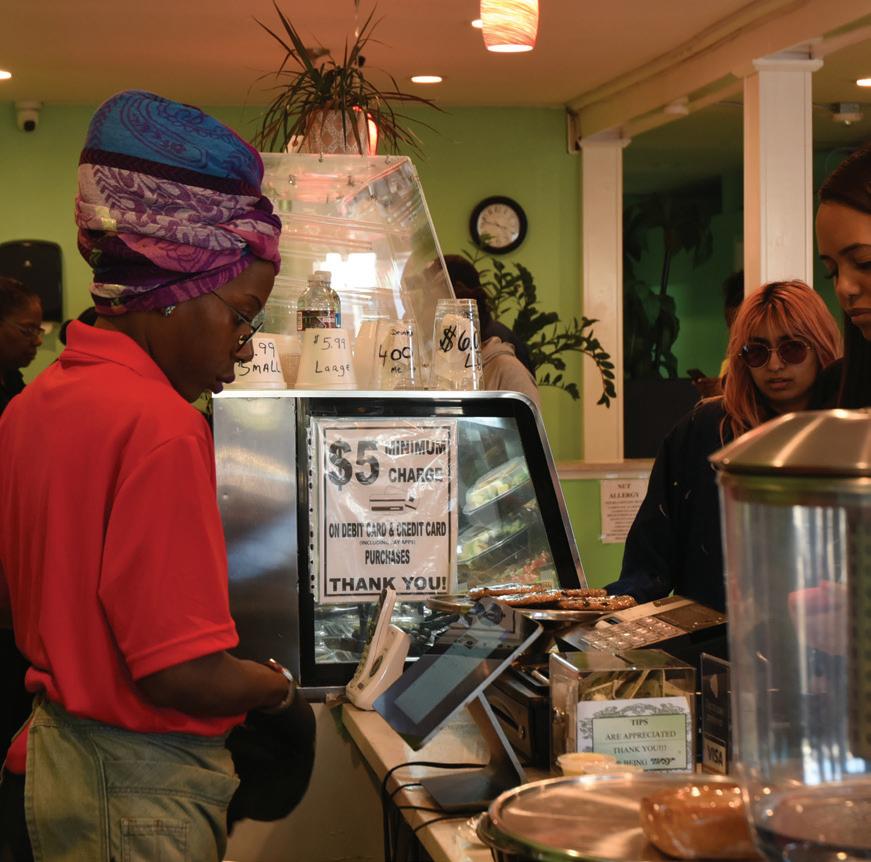
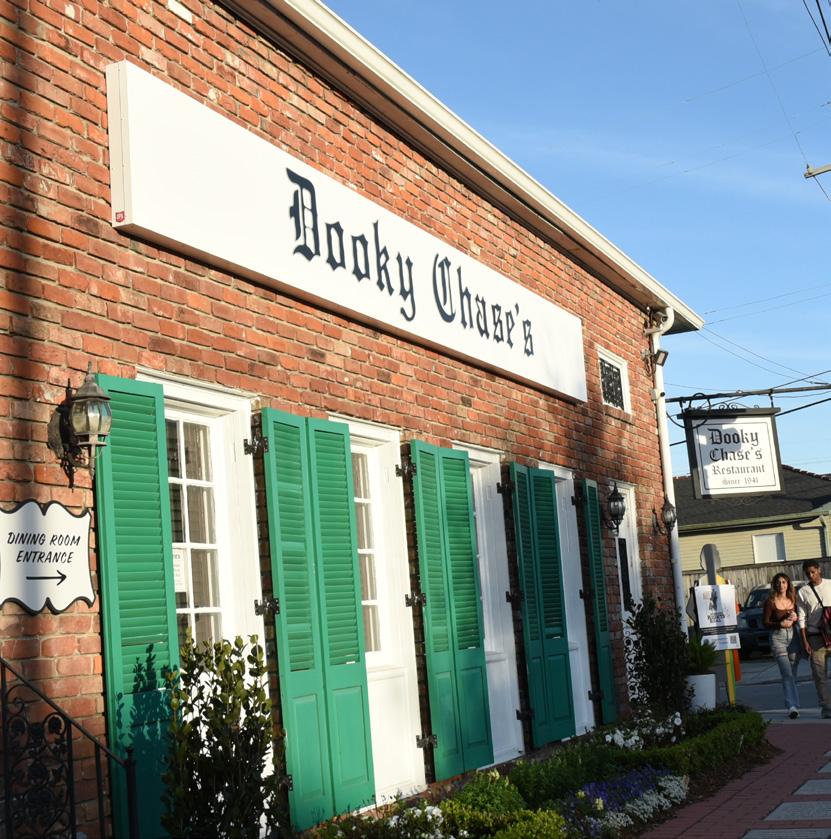 By Maleigh Crespo macrespo@my.loyno.edu
By Maleigh Crespo macrespo@my.loyno.edu
The city that many of us call home is also home to many Black-owned businesses that encompass the rich history and culture of this unique place. This listicle is just a few of those businesses that should be supported when in the Big Easy year-round, but especially during Black History Month.
Community Book Center
2523 Bayou Rd, New Orleans, LA 70119
Nestled in the heart of the Seventh Ward, Community Book Center is “more than a bookstore.” It has served the New Orleans community since 1983, selling Afrocentric books, art, clothing, accessories, and a variety of other trinkets. The center also hosts various community events such as book signings, storytelling, and community meetings.

Hours: Tue-Sat, 10 a.m.-6 p.m. For more information, follow the center on Instagram @readcbc.
Club Caribbean
2441 Bayou Rd, New Orleans, LA 70119
Located in Esplanade Ridge, Club Caribbean is the only reggae club in New Orleans, according to their website. The club hosts a variety of events, including Soca Ladies Fridays and Dance Hall Saturdays.
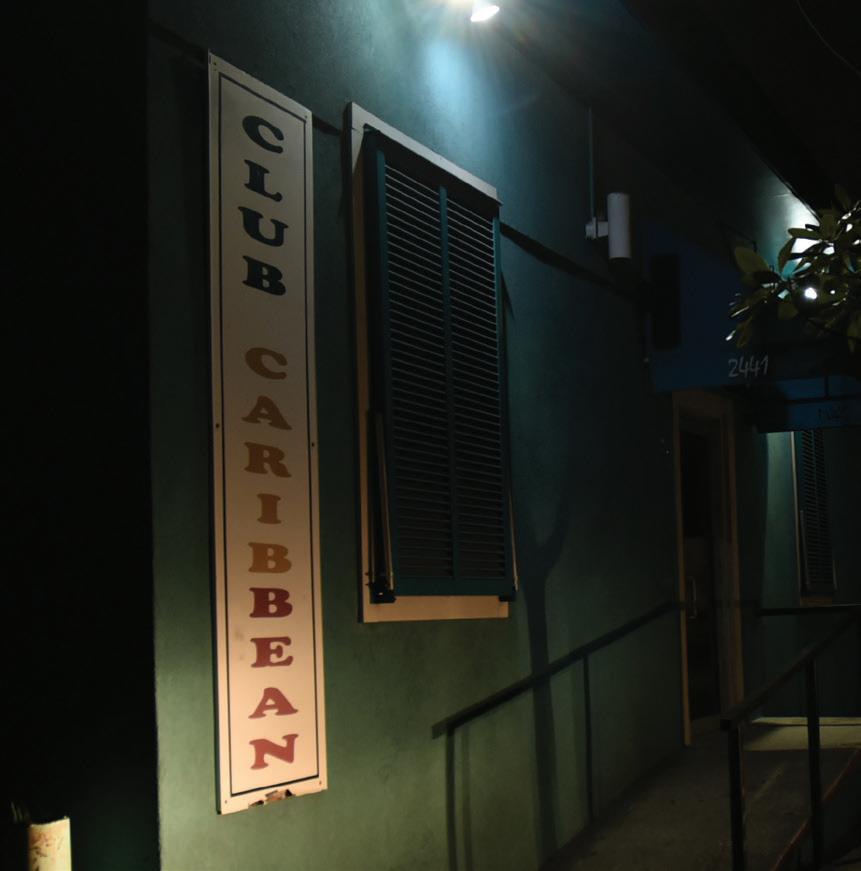
Hours: Thurs-Sat, 6 p.m.-3 a.m. For more information, follow the club on Instagram @clubcaribbeanno.
A new face is rising in NeoSoul and R&B
By Sofia Luciano silucian@my.loyno.edu
Known by their fans for their sweet and tender melodies, Aniya Teno has captured the soul and attention of those who listen to their music.
The Loyola music industry junior from New Iberia, Louisiana first started singing in choir and other music ensembles at the age of five and continued throughout their early and high school education.
“It was just something that I was always supposed to do,” Teno said.
Teno said they grew up in a household where R&B and rap were always playing, and some of their biggest inspirations are Stevie Wonder, Michael Jackson, Prince, Kehlani, and H.E.R. They also said they started writing lyrics at the age of 12 and began recording at 16 years old when they got their first set up.
“My family has always been a big R&B and rap family. My dad is more rap music, and my mom is very R&B. So I always had that influence,” Teno
said.
Growing up in both Louisiana and Texas, Teno said they were exposed to different sounds across cultures.
“I spent a lot of time around Hispanic people, white people, and Black people, so I got into a lot of different genres that I have kinda meshed in my music,” Teno said.
Teno said they have always been surrounded by music, but said they pinpoint their songwriting journey to the first good song they wrote titled “Deserted Friends” when they were 14 years old.
“I just got a message like two days ago from someone, saying ‘your music makes me feel like I'm ascending,’” Teno said. “I’m queer, so I have a lot of LGBTQ+ Black people as my fans, so they always hit me up and say ‘I relate to this’ or ‘I relate to the things you're saying here.’ I never expect what people are gonna feel.”
“People are able to form a deep and intimate connection with Aniya and their music,” said Loyola hip-hop and R&B music production junior Matthew Eghdami. Teno has played house shows with Eghdami at his house, he said. “While Aniya mostly does R&B, they are comfortable making music in any style and are able to do so very well. Overall Aniya is not someone you can put in a box by any means,” he said.
Their most popular song to date is
titled “Direction'' with Ivan Orozco. The song is an R&B bolero tune where Teno sings verses in both Spanish and English Teno has released other projects like “Eve” and “Angel” and released their first single “Seasons” in 2020.
“What inspires me is other artists. I grew up on artists like Jazmine Sullivan, Marsha Ambrosius, Erykah Badu, Jill Scott, those artists. I always think back to those artists and what they do in their music that makes it good,” Teno said. “Listening to the hits, what makes this song a hit song and all the elements. I remind myself of those things while I'm writing or recording.”
Their most recent single, “Take a Look,” produced by Loyola hip-hop and R&B sophomore Deven Raval was made under Wolf Moon Records, Loyola’s record label.
“We did one song before ‘Take A Look,’ the previous semester before it actually came out. We couldn't put it out because of technical difficulties, so ‘Take A Look’ really came about randomly,” Teno said. “I was in the studio with my friend Deven. He's a producer. He's like my partner, and he played this beat, and I just started writing immediately, and I knew this was the single.”
Teno said they have been working with Raval ever since they moved on campus.
“Every song you hear of mine now is produced by them,” Teno said.

Teno and Raval share more than just a creative bond in the studio. The duo is starting a collaborative group called 7TEN, and are planning the re-
Dooky Chase's Restaurant
2301 Orleans Ave, New Orleans, LA 70119
Dooky Chase's was founded by Emily and Dooky Chase Sr., and has become a New Orleans staple with Dooky Chase Jr. and his wife, Leah Chase, at the helm. Chase Jr.’s wife has become known as the “queen of creole cuisine,” and has a James Beard award under her belt. The restaurant is not only known for its authentic cuisine, but also its rich history. Before Plessy v. Ferguson, Dooky’s was the home of many civil rights discussions. Today, it adorns this history on its walls and in its atmosphere.
Hours: Tue-Fri, 11 a.m.-3 p.m. and FriSat, 5:30-9 p.m.
For more information, follow the restaurant on Instagram @dookychaserestaurant.
Sweet Soulfood
1025 N Broad St, New Orleans, LA 70119
Sweet Soulfood takes the comfort of New Orleans-style soul food and combines it with veganism. The food is not only vegan but organic and soy-free. The restaurant also offers an almost entirely gluten-free menu on Mondays.
Hours: Mon-Sat, 11 a.m.-5 p.m.
For more information, follow the restaurant on Instagram, @sweetvegansoulfood.
lease of their upcoming project.
“It's been a lot of work but I'm very excited once the project comes out. We're trying to do a lot of things: travel, network, and kind of push the project as much as possible to build our brand,” Teno said.
As for upcoming personal projects,
Teno said a new single will be released in March, and the EP will be released in April.
Abigail Schmidt contributed to this story.
7 February 10, 2023 THE MAROON Film • Arts • Food • Music • Leisure • Nightlife
LIFE & TIMES
Aniya Teno works with Deven Raval on music in a Loyola studio on Dec. 8, 2022. Teno recorded all of their music here with Raval producing. Ryan Talley/The Maroon
Photos by Anna Hummel/The Maroon
“It was just something that I was always supposed to do.”
— Aniya Teno Loyola music industry junior
"Neutral Ground isn't a place, it's a community."
Neutral Ground owners left "heart broken," start GoFundMe page to find new location for coffee shop
By Macie Batson mmbatson@my.loyno.edu @maciembats
Caroline Williams, known by most as Phant, broke down in tears last Thursday when she was greeted at the door by someone who mistook her for the realtor of the building where her beloved coffeeshop Neutral Ground is housed. Williams said they weren't told when they had to go or how long they could stay, but they've already begun preparing for Neutral Ground to be in "exile" until they can land elsewhere, after hearing news the building was being sold.
Neutral Ground Coffeehouse is a "community space, part gallery, half stage," usually referred to as a safe "third" place for artists to use as a testing ground to "hone their craft," and for the community of all ages to relax and have some coffee, according to the coffee shop’s website.
Co-owners, or "caretakers," of the quirky uptown café where many artists often make their debut, Williams and James Naylor, said they were devastated when they discovered the building that houses their coffeeshop was being sold.
“I had a walkthrough of my own space, that I rent, with no knowledge or consent on my part,” Williams said.
The two previously purchased Neutral Ground in 2020 from previous caretakers, but have been associated with and managing the cafe for over 20
years. However, Naylor and Williams do not own the property on which the coffee shop has been located since the late 70s.
The building has been owned by property manager Jonathan Wallick since 1997, who the couple regarded as a great landlord who hasn't raised their rent in 20 years.
“Otherwise, we would have been long gone,” Williams said. “We don’t make enough money.”
According to Williams and Naylor, Isidore Newman School, which is just a block away from the coffee shop, has had its eye on purchasing the building for years, and because the school has been purchasing other buildings surrounding this area, they said they expect their building to be the next.
Due to the high cost of the building, Naylor and Williams said that purchasing it would be “out of reach,” and agreed that they would have to find somewhere else to run their business.
“I think a lot of the community is still hoping that we could buy this building because there's so much nostalgia here,” Williams said. “A lot of the community is in denial that we're going to move.”
Loyola popular commercial music senior and singer/songwriter Gabe Parsons shares the nostalgia, as his first-ever New Orleans gig took place at Neutral Ground, and he has since played 11 additional shows there during his undergraduate years.

The charm of Neutral Ground, apart from the luxury of being able to sit, ac-
cording to Parsons, is that anyone can perform and feel comfortable and safe enough to do so.
“It's just a very, like, odd place, but in a good way,” Parsons said. “I think that places like that need to exist in the world, especially in New Orleans, which is kind of an odd city.”
Some of Parsons' favorite memories of playing come from Neutral Ground, he said. He got his start in New Orleans from Loyola’s monthly “Singer/Songwriter Thursdays” at Neutral Ground, as have many other upcoming Loyola artists. He said it is a good way to test and perform your songs to the public.
“As an artist, you perform because you want people to listen to what you're trying to say, so I feel like the Neutral Ground has always been a really great space to showcase your work, especially when it's new,” Parsons said.
Pablo Amat, a Loyola sophomore in popular and commercial music and a regular performer at "Singer/Songwriter Thursdays," agreed that the cafe allows comfort for shy performers to start in a small space with a small audience.
In his seven performances at Neutral Ground, Amat said that he has learned many things from playing there.
“I definitely think Neutral Ground has benefited Loyola. It’s a great exercise to play a set just you and your instrument. It’s a challenge,” Amat said. “It's taught me that playing acoustic versions of your songs isn’t as easy as
one would think.”
In terms of upcoming Loyola events at Neutral Ground, Naylor said that he and Phant intend to host them unless they are informed otherwise, but that the factors include when someone purchases the building.
Williams said that even if they were able to get a loan for what the property manager was asking for the building, they would have to be making double the money they’re making now.
“Everyone else in this building would have to have double their rent, and that's just not realistic,” Williams said.
Nonetheless, the couple said they still felt "heartbroken" learning that the coffeehouse will no longer remain in its current location.
“We felt horrible. I’ve been having horrible dreams that things are just crashing in front of me that I can’t control. We’re heartbroken,” Naylor said. “This has been, you know, so much of our lives, so much of so many people's lives.”
Parsons said that while he feels sad that the Neutral Ground is facing closure, a new location could benefit the business.
“I love the Neutral Ground, but you know, it's kind of in a quiet neighborhood,” Parsons said. “There are no other shops really around it. It's very standalone.”
Parsons added that it might be better for the coffee house to be located closer to where students often hang out, potentially around Freret or Ma-
ple street.
When they relocate, Naylor said the goal is to stay in the Uptown neighborhood so they can be close to Loyola and Tulane’s campuses, but everything is "still on the table." He added that although the cafe might remain “homeless” for a time, they are going to do everything they can to keep the business going.
“Neutral Ground isn't a place, it's a community,” Williams said.
Naylor and Williams started a GoFundMe page this week to raise money for a down payment on a new potential building that will keep rent low.
“Phant and I are looking at buying a building for the coffeehouse to live for another 40+ years but we need your help,” the GoFundMe page read. “We have a few places in mind, one particularly that has an apartment that would offset our rent and keep the Neutral Ground inexpensive and open for all to enjoy.”
Given the belief that Neutral Ground is a community rather than a physical location, Parsons expressed his confidence that the community would follow them wherever they went.
“Is the idea stronger than the location… I think the idea is stronger than the location,” Parsons said.
Abigail Schmidt contributed to this story
8 February 10, 2023 THE MAROON
Neutral Ground Coffee House is a community center Daneel Street. The New Orleans staple has been around since the late 1970s, and its building is in danger of being bought out. Torrie Shuff/The Maroon
Wolf Pack swimming welcomes British talent who's rewriting record books
By Brendan Heffernan bmheffer@my.loyno.edu @heffthereporter
When Harvey Quiddington stepped onto Loyola’s campus for the first time last summer, he’d already competed at the highest levels of British amateur swimming. But as he got settled into his dorm, Quiddington was thinking about the fact that he’d never competed inside the fluorescent-lit thunderdome of an American big box store.
Quiddington answered that challenge his first morning in New Orleans, demonstrating the can-do attitude expected from a scholarship endurance athlete. The expat walked nearly four miles there and back from campus to the Tchoupitoulas Street Walmart Supercenter, where Quiddington said he got his first taste of American culture.
“I got here, fell asleep, woke up, and walked to Walmart,” said Quiddington, a history pre-law freshman. “It’s been great, I’ve gotten to do a lot of obnoxiously American things.”
In the months since that stroll along the Mississippi, the London native has only been obnoxious toward opposing coaches tasked with finding swimmers to put against him. Quiddington’s been a consistent difference-maker for the Wolf Pack, setting school records in the 200-yard breaststroke and the 400-yard individual medley, while notching 10 first-place finishes during the regular season. He also maintained a perfect 4.0 GPA throughout his first semester in New Orleans.
Quiddington said he knew he wanted to swim for an American college several years before deciding on Loyola, which stood out to him because of its academics and name recognition. Prior to beginning his collegiate career, Quiddington had placed as high as seventh in the 200-meter breaststroke at the United Kingdom’s national swim meet.
While preparing to swim at the Sun Conference Championship in Columbus, Georgia, which takes place on Feb.
9-11, Quiddington said that Loyola has felt like a perfect fit.
“I feel like the best decision I’ve ever made has been coming out here and seeing what’s going on,” Quiddington said.
Head swim coach Thomas Natal said that while he knew he recruited a talented swimmer, observing what Quiddington has brought to the Wolf Pack has been a wonderful surprise.
“I think in every aspect Harvey was better than I could have thought,” Natal said. “He’s a super hard-working young man in the classroom as well as in the pool. He’s such a good teammate, very encouraging to those around him, and just a nice guy to be around.”
Quiddington posted times in the 200yard breaststroke and 400-yard individual medley, which put him in the top 20 in the National Association of Intercollegiate Athletics in both categories according to Swimcloud’s swim meet database. Those strong showings have put him in a comfortable position to qualify for competition in both events at the NAIA national meet next month, according to Natal.
Quiddington set those times while adjusting to more than just the new accents and access to bigger bags of junk food. In England, Quiddington raced in “long course” pools measured at 50 meters. In the NAIA competition, Loyola swims in “short course” pools measured at 25 yards. Swimming in a smaller pool means the races Quiddington grew up swimming have a completely different rhythm, Natal said.
“It was almost like starting a painting from scratch,“ Natal said. “In his events it’s almost a completely different race. It’s much more taxing on the body, it's a lot more fast tempo. Of all the strokes, in my opinion, breaststroke is the most different between long course meters and short course yards.”
Quiddington adjusted to American racing by adopting a more high-intensity training program, which he said he prefers to the distance work he did with his
club in London.
Quiddington’s work ethic caught the attention of his teammate Tate Bolden, another freshman who’s claimed a pair of Wolf Pack school records himself. Bolden said Quiddington has set a high standard in training sessions and brought a unique dynamic to the locker room.
“European competitions are really interesting, being able to learn about that from him has been really cool,” said Bolden, a graphic design major. “He’s definitely brought a very interesting dynamic to our group of friends.”
Quiddington said that Bolden and the rest of his teammates have been a crucial source of support throughout his time abroad. Quiddington said one of the first things he tried to do with his new American friends was challenge their negative perceptions of British cooking.
“I’ve introduced them all to the full English breakfast several times now and most of them are fans,” Quiddington said. “I haven’t shown them the black pudding though, but if you try it you’ve got to love it.”
Loyola’s swim program is a more team-oriented environment than his club in London, which Quiddington said he loves. He’s even picked up a new nickname from his American teammates: “squid,” a play on both his last name and comfort underwater.

“Everyone chants ‘squid’ when I’m behind the blocks,” Quiddington said. “I’ll make a turn and hear ‘squid!’ It cracks me up.”
Quiddington said his ultimate goal for his freshman season is to make the final cut at nationals in both of his best events. Natal said he believes Quiddington will be able to accomplish all his goals and more before his time in Uptown is finished.
“Harvey’s already taken down several records and I see him taking down more,” Natal said. “While he’s been successful this year, man, it’s going to be fun watching him the next few years.”
Cheerleading seeks to reach new heights
By Elle Haavie elhaavie@my.loyno.edu
Loyola’s cheer team does “so much more” than their routine appearances at sporting events, said Gabby Kliebert, one of the team’s captains.

The team is in full swing and training hard as they prepare to compete in their competitions. Both captains, Ana LeBlanc and Kliebert said they are optimistic about the upcoming regional qualifier competition Feb. 10 in Mobile, Ala.
“We’re in the gym every single day making ourselves better,” Kliebert said. “We want to go to nationals. We’re hoping that we can get our foot in the door this weekend.”
The team won their first meet of the season on Saturday, Feb. 4 after competing in two dual meets against Dillard University.
Each team performed twice, with Loyola scoring 73.9 and 74.25 out of 100, and Dillard scoring 63.35 and 66.25. According to Wolf Pack Athletics, Loyola's choreography was also rated by judges on a scale of 1 to 10, and they received a score of 8 and higher in both rounds.
“We do a lot of conditioning work,” said cheer and dance coach Dylon Hoffpauir. “We work out twice a week with Ochsner fitness trainers. We have practice three times a week for three hours a day. They put their bodies through a lot. It’s a lot of discipline and a lot of time.”
The team made it to the National Championships in 2020, but the competition was canceled due to the COVID-19 pandemic.
“As soon as the team got there, they had to turn around and come back, so this would be our first time competing,” Kliebert said. “This year we get to be concrete in what we want out of the season and make all our dreams come true.”
This year’s championships will be held on March 10 in Ypsilanti, Michigan. Hoffpauir and the captains plan to lead the team to victory with positive and confidence-instilling leadership styles.
“We try to come in every single day motivated, and push ourselves to be the best that we can be for everybody else,” Kliebert said. “The work that we put into this is a full year commitment, so we grind hard.”
Hoffpauir said that his goal for the season is to instill as much confidence as he can.
“I want them to feel invincible after this season,” he said. “I’m not thinking about winning or losing, I'm thinking about progressing their mindset. If we can do that, I think this season will go in our favor.”
SPORTS 9 February 10, 2023 THE MAROON
Senior biophysics major and co-captain Ana LeBlanc stands at the top of a pyramid during their routine at the University Sports Complex on Feb. 4, 2023. The Wolf Pack defeated Dillard University on both days of the competition. Ryan Talley /The Maroon
Photo of swimmer and history pre-law major Harvey Quiddington is pictured at the University Sports Complex pool. Quiddington joined the team last in the Fall of 2022 and owns multiple school records. Courtesy of Brendan Heffernan.
We need more than a sweatshirt
SGA's merch drop highlights their priorities
While the newly unveiled student government merch is fire, it has reignited some age-old concerns about what is a priority for our student government.
The Student Government Association spent $2,693 on this merch drop. That doesn’t seem like a lot, but that’s $1,193 more than the budget request for the Loyno Flea Market last semester, which SGA president, Stephanie Oblena, vetoed. The flea market, which SGA hosted in 2021, was meant to directly benefit student artists and serve as a fundraiser. In 2022, Oblena vetoed the flea market because she claimed it would not directly benefit the students and was “not a priority,” unlike free merch reminiscent of Steamboat Willie. Flea market organizer Adele Coulson, however, said the situation was reflective of an overall lack of representation for art students, and student artists, within SGA.
Despite not receiving SGA funding, the flea market ran last semes-
ter with fundraising provided by the Loyno Costume Shop, but the concerns about the veto of its funding from SGA remain. And those concerns have heightened in wake of this new merch drop. Why is one project more important than the other? When is student government reaching out and actively seeking the input of the students that they are meant to represent?
Oblena promised the student body that “we’re here to work for you and absolutely want to hear your needs.”
What we need is the active listening to students that was promised and the care that each student’s interests deserve.
We want an SGA that fights for students against the administration and uses the immense power they wield to make the campus better for all students. We want an SGA that fights for construction transparency, student rights, and equal representation of students from all areas of campus.
If you were to ask students on campus what SGA does, most of them wouldn’t have a clue aside from the occasional event planning. This is bad marketing, which something like a merch drop won’t fix. Sure, the new merch will increase the number of times people read the words ‘student government’ on campus. But what experts like Butch Oxendine, the American Student Government Association Director and Founder, recommends is increasing the presence of SGA members across campus with things like having senators shadow club meetings on campus and consistently polling student sentiment. These, among other things, are what could improve the campus-wide presence of SGA in meaningful ways. More meaningful than school spirit events or free tote bags.
In the wake of budget cuts for SGA this year, whose funding is down 9%, it was admirable to see both the president and vice president of the organization take a
$2,000 pay cut during the fall semester of 2022. But that still left them with around $6,000 each for the fall alone, which includes a housing stipend.
A portion of every student’s tuition pays for SGA salaries and budget. More than just a small portion of the student body should know what SGA is doing to benefit them. The last newsletter students received from SGA was in October of last year. Instagram shouldn’t be the only place for students to get regular updates about what SGA is doing and when they will meet.
Students, don’t get blinded by the trendy, free merchandise (although, if we’re being honest, you paid for it whether you get some or not). Demand to be heard. Demand to be represented. Demand the promises made by your SGA representatives be fulfilled to the level you deserve before their time runs out.
HOWLS & GROWLS
HOWL to Joseph Gordon-Levitt
GROWL to hand, foot, and mouth disease
HOWL to Valentine's Day
GROWL to Valentine's Day
HOWL to Black History Month
GROWL to Harry Styles' Grammy speech
HOWL to password sharing
EDITORIAL BOARD
Macie Batson & Jackie Galli
Editors-in-Chief
Cristo Dulom Managing Editor for Print
Ava Acharya Managing Editor for Digital
Devin Cruice News Director
Maleigh Crespo Design Chief
Gabrielle Korein Photo Editor
Patrick Hamilton News Editor
Abigail Schmidt Life & Times Editor
Aron Boehle Worldview Editor
Matthew Richards Sports Editor
Mark Michel Opinion & Editorial Editor
Kloe Witt Breaking News Editor
Mia Oliva Reviews Editor Equity & Inclusion Officers
Victoria Hardy & Melody Newsome
Arianna D'Antonio Senior Staff Writer
Torrie Shuff Senior Staff Photographer Copy Editors
Heather Rabassa & Violet Bucaro
Bella Kelley Social Media Coordinator
Alexis Horton Assignment Editor
EDITORIAL POLICY
The editorial on this page represents the majority opinions of The Maroon’s editorial board and does not necessarily reflect the opinions of Loyola University.
Letters and columns reflect the opinions of the authors and not necessarily those of The Maroon’s editorial board.
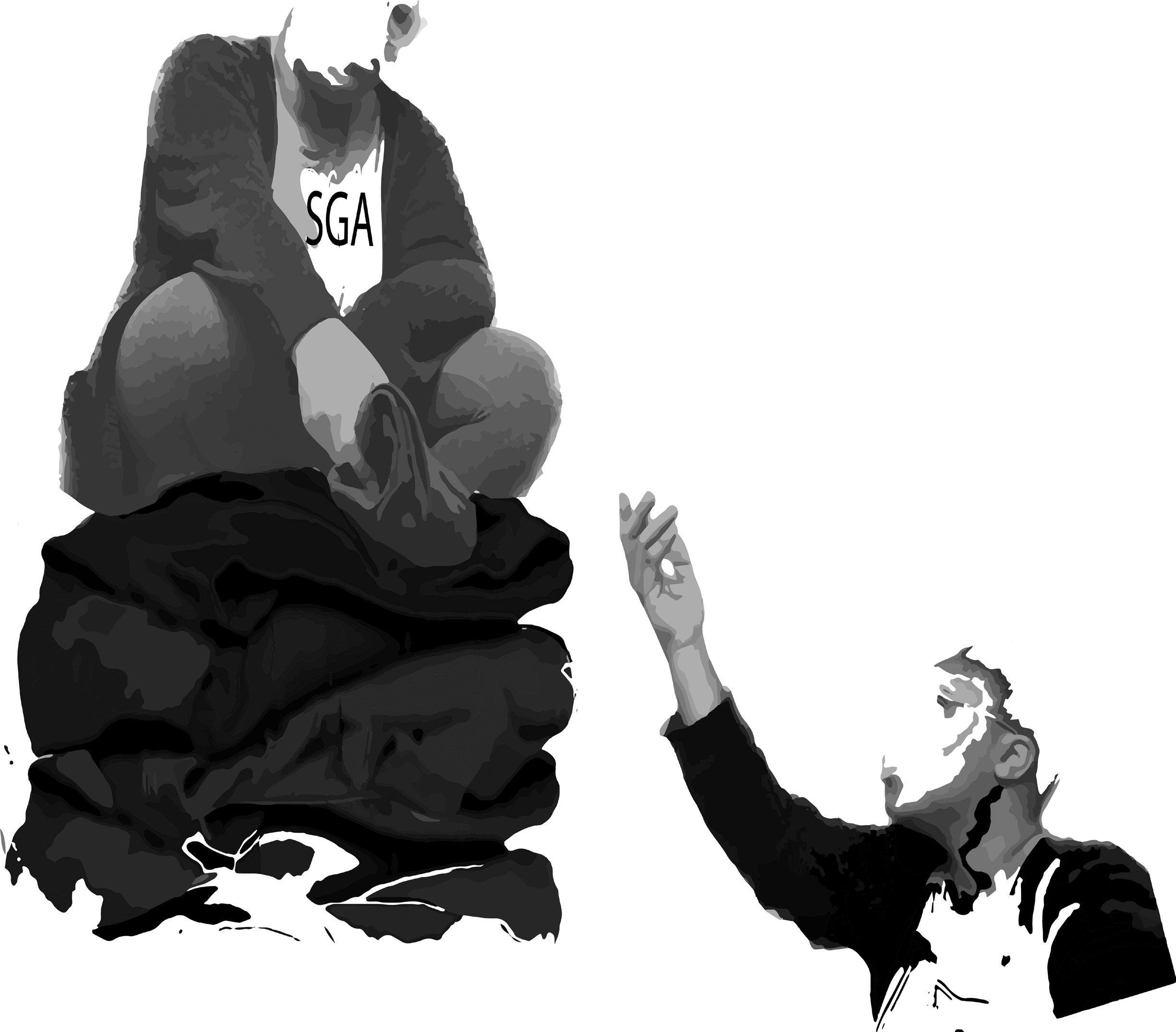
The Maroon does not represent the opinion of administration, staff and/or faculty members of Loyola.
Letters are subject to editing for length, grammar and style. Please limit submissions to 400 words. Submissions are due no later than 4 p.m. the Sunday before publication.
Please send all submissions —
The Maroon, 6363 St. Charles Ave., Box 64, New Orleans, LA 70118.
Email us your letters — letter@ loyno.edu.
Submissions may also be made online at www.loyolamaroon.com.
EDITORIAL February 10, 2023 THE MAROON 10
Celina Watkins/The Maroon
Loyola needs to increase campus accessibility
Blu DiMarco History freshman mddimarc@my.loyno.edu
The trip in a wheelchair from Buddig Hall to the inside of Mercy Hall is roughly 20 minutes. I have to navigate through the crowded parking lot, and the patterns on the ground that cause a kind of resistance on my wheels that require a full body effort. I attempt to enter on the side closest to me. I can't get in. I’m faced with a set of stairs. This is okay, I will attempt to find another entrance. Wheeling to the other side of the building, facing Calhoun, I find the sidewalk shrinking around me. At this point, I'm already five minutes late to class. The sidewalk isn't big enough to fit my wheelchair, and the broken, uneven pavement makes my wheelchair harder to control. I start panicking. There is no way I can make it to class on time at this point, and I've found myself unable to control my wheelchair. I’m going down this short slope and my wheel has fallen off of the sidewalk. I know what will happen next. It’s 9:23 a.m. on a Tuesday morning, and I'm sitting in the mud several feet away from my wheelchair. I sit in this position for a minute. I feel like this feeling will last forever. Why should I use my wheelchair? If this is supposed to help me, then why do I feel like I often find myself in these trapped positions of embarrassment and anger? I need my wheelchair. I find my circular thoughts are disrupted by students.
“Oh my god I think she fell out of her wheelchair! Oh my god! We have to help her.”
In my shame and embarrassment, I find myself becoming a public spectacle. No one speaks to me. They begin touching me, grabbing me, pulling me out of the mud.
“No, it's okay, I’ve got it. I can get up.”
I bet after this they will carry their head up for the rest of the day knowing that they are saviors. I mean, without them, what would I have done? They’ve misgendered me, broken my personal space, and dehumanized me.
“You poor baby! I hope you’re okay!”
At this moment, I am nothing more than my wheelchair. As an ambulatory wheelchair user, not only do I feel unsafe using mobility aids on campus, I feel like it defines me negatively.

The ADA defines a person with a disability as a person who has a physical or mental impairment that substantially limits one or more major life activities. This includes people who have a record of such an impairment, even if they do not currently have a disability. It also includes individuals who do not have a disability, but are regarded as having a disability.
According to Chris Rice, head of residential life, all buildings of Loyola's campus are ADA approved. Yet, the truth is that our campus is far from that. The ramps are too steep, the ADA push plates don’t work, elevators break down often, and students on campus don’t know how to behave themselves.
When elevators break down, it’s an issue for almost everyone, yet it affects students with disabilities more so. No one receives any notice about a broken elevator. While most students can quickly decide to trek down the stairs instead of being late to class, those of us with disabilities cannot. TRIO is a themed living community on campus that accepts students by the following: they are identified as a first-generation college student,
have a disability, and/or come from a low socio-economic background. For a TLC that has one of the main aims is to assist students with disabilities, why are these students placed on the 10th floor of Buddig? How is this fostering an accessible environment?
In the past, discussions of accessibility on campus have been spoken for by able-bodied people. Due to this, one thing never discussed is the campus culture around using mobility aids on campus. While this holds true in most public spaces, at Loyola, it fills me with fear. Using my wheelchair on campus has made me a direct target for death stares, unwanted touching and attention, and comments that leave me feeling insecure and isolated. Elevator rides are longer than ever. I get prodded with questions. “Why are you in a wheelchair?” “What’s wrong with you?” “Are you like sick or something?” These are the questions you might expect from a child. Not so much a group of 18-to-19year-old college students.
In the future, I would like students on this campus to be able to feel as though we are safe. Safe to express ourselves, safe to use our mobility aids, safe to walk with a limp, and be okay with just that. Being disabled is not a hard label or definition, we as a campus community need to understand that disabilities span far and wide across our campus, and what is and isn’t a disability isn’t something for an able-bodied person to define. Able-bodied students should have a more nuanced understanding of the disabled identity and the truth of their privileges when simply walking around campus. Look around your dorm, your classrooms and ask yourself: is this fostering a space for students with disabilities? Are you complicit in these issues? Where do you stand?
Fraternities should be abolished
differently, because each university handles its Greek life differently. Some are more severe than others and some offer up excuses.
Picture this: it’s your freshman year of college, you’re in a completely different part of the country, and you are meeting new people. One of the girls you met a month ago invites you out to a frat party. You’re excited because all you’ve seen on social media was your friends back home partying at frats, so you think: “this must be fun!”
You get to the party and realize it’s a pitch-black living room with college boys hunting girls as if they were prey, and the entire night is filled with men coming up to you, treating you like an object, a prize to be won.

Believe it or not, this was my first and only frat party experience.
Going to a school like Loyola, all I hear from my peers is that ‘Loyola Greek life is nothing like other school's Greek life.’ This night made me really question that. I never felt comfortable with the idea of a fraternity or a sorority, just because of the things I would hear about them on the news. This association is baked into its history.
One fraternity that is often in the news is Phi Gamma Delta, better known as, FIJI. According to their Lambda chapter's website, their motto is, “friendship, the sweetest influence,” but do they follow this motto?
On Aug. 24, 2021, a fraternity brother from FIJI’s University of Nebraska chapter was charged with sexual assault on a minor. Now, the university student code of conduct board announced that they “suspended the FIJI fraternity through 2026,” but then explained that since they do not run FIJI or own any of their property off campus they are still an affiliation within themselves.
At the University of Iowa’s FIJI chapter, a young woman who went to the university is now filing a lawsuit against FIJI and the two brothers who sexually assaulted her in September 2020. The two men accused were expelled from the fraternity and are no longer enrolled at the university.

On the other hand, some universities don't require their sororities and fraternities to follow the same rules as other student organizations. University of Alabama’s Greek life does not have to follow Title IX or its non-discriminatory policies in order to be recognized by the school, as stated in their student book of conduct.

These schools respond to the assaults
These excuses sound like the phrase “boys will be boys,” meaning that the sexual actions that boys inflict on girls are just human nature, and they shouldn’t be held accountable for it. Why are we not holding these fraternities to a higher standard, and why are we letting them be in our places of learning? The two young men got expelled from the fraternity, but the fraternity wasn’t held accountable. How many times does a girl have to be sexually assaulted for a fraternity to be shut down and never allowed on any college campus? The FIJI chapter of fraternities should be shut down because of their actions. It shouldn’t matter what campus these events happened on; they should be abolished and never allowed back.
Their motto is not being followed. They don’t look for friendship. They look for violence and power.
Fraternities and sororities were not just made for young men and women to “make friends.” Greek life was created to socially isolate rich white people from the others around them. It wasn’t until the end of the 1960s when they were “desegregated.”
We are not holding these groups accountable for their actions, which leads to them getting away with anything they want. Because these groups were founded on exclusivity and superiority, they have fostered a culture of toxic masculinity and violence.
Fraternities were never created to bring everyone together, they were made in order to discriminate. Why are we acting like they have changed when clearly they haven’t?
We should demolish Greek life and all the sexism and racism they stand for. Their foundations are based heavily on oppression, and we need to get rid of them. And for the people who say “Greek life has come so far,” have they? Or have we just turned our cheeks and ignored all the bad that continues to happen?
As a freshman, I romanticized these frat boys and their parties. This is due to American culture and how they portray Greek life in movies and media. Yes, in the news, fraternities don’t look good, but in American entertainment, fraternity parties are seen as the thing all American college students go to.
We need to stop looking at these organizations through rose-colored glasses. We have to stop romanticizing the “perfect” fraternity and sorority in the media because there is no such thing.
If we want to make college life safer and less discriminatory in America, we have to start by abolishing Greek life.
OPINION 11 Febrauary 10, 2023 THE MAROON
Margo Weese/The Maroon
Jenna DeLucia/The Maroon
Maria DiFelice Mass communication sophomore mldifeli@my.loyno.edu



M Y CM MY CY CMY K Full page color - 10.5w x 14h.pdf 1 2/18/22 11:10 AM

 By Maleigh Crespo macrespo@my.loyno.edu
By Maleigh Crespo macrespo@my.loyno.edu













 By Arianna D'Antonio asdanton@my.loyno.edu
By Arianna D'Antonio asdanton@my.loyno.edu






 By Maleigh Crespo macrespo@my.loyno.edu
By Maleigh Crespo macrespo@my.loyno.edu













